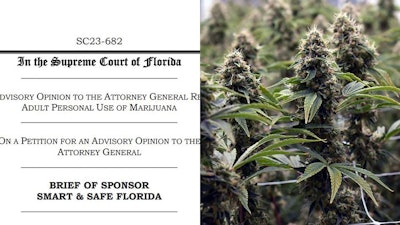
With the initiative hanging in the balance of judicial review in the Florida Supreme Court, where justices in 2021 killed a pair of previous legalization attempts to land on the 2022 ballot, the sponsors of the 2024 ballot proposal filed a 99-page brief July 19 in an attempt to sway a pending decision in their favor.
“After years of experience with medical marijuana and after watching nearly two dozen sister states allow adult non-medical use of marijuana, Florida citizens have sought to put the issue to a vote as well,” proponents wrote in this week’s brief. “In 2021, however, this court held that two such initiatives contained affirmatively misleading ballot summaries.”
The brief was filed on behalf of Smart & Safe Florida (SSF), a political action committee chaired by David Bellamy, of the Bellamy Brothers music duo, and financially backed by Tallahassee-based multistate cannabis operator Trulieve, which has contributed more than $39 million toward the initiative so far, according to the Florida Department of State.
The 99-pager outlines three overarching arguments to suggest the 2024 initiative is sufficient to appear before voters, who would need to carry a 60% majority to pass the measure next November—a measure that would amend the state constitution:
- The ballot summary clearly and unambiguously discloses the amendment’s chief purpose and is not affirmatively misleading;
- The amendment embraces one subject: allowing adults 21 years or older to possess, purchase and use cannabis; and
- The proposed amendment does not violate the Supremacy Clause of the U.S. Constitution.
These arguments come on the heels of Florida Attorney General Ashley Moody calling the ballot initiative misleading to voters in her attempt to have it killed by the seven justices who serve on the court, five of whom were appointed by current Gov. Ron DeSantis, a vocal opponent of legalization.
When asked about the possibility of adult-use legalization during a 2019 interview, DeSantis said, “Not while I’m governor.”
Throughout the majority of Moody’s opposing arguments in a brief filed June 26, she continuously pointed to what she called the misleading nature of Smart & Safe Florida’s proposal.
But the attorneys—led by John F. Bash of Quinn Emanuel Urquhart & Sullivan LLP in Austin, Texas—who filed this week’s counter brief on behalf of SSF wrote that the state’s chief legal officer is attempting to change the rules of judicial review.
“In the past several years, this court has established a ‘roadmap’ for sponsors of marijuana-related ballot initiatives,” the attorneys wrote. “In drafting the initiative, SSF followed that clear roadmap. But the attorney general and other opponents now argue that this court should abruptly redraw the map.”
SSF’s First Point
Bash and other legal representatives on behalf of the proposed ballot measure argue that the ballot summary is clear and unambiguous, therefore satisfying the legal requirements to comply with Florida law.
One of Moody’s main arguments is that the amendment implies that it would “allow recreational marijuana,” when in fact cannabis would remain a Schedule I controlled substance under federal law.
To counter this point, SSF attorneys argue the text of the amendment itself provides that “Nothing in this section changes federal law or requires the violation of federal law or purports to give immunity under federal law.” (Emphasis in the original text.)
The proponents’ brief states: “No reasonable voter would read the summary’s direct warning about federal law to mean anything other than that the longstanding, well-known, and near-total federal prohibition on marijuana possession would remain unaffected by the proposed amendment.”
The SSF attorneys also argue that: the ballot summary is not misleading with respect to licensing of non-existing medical operators; Moody does not show that voters would be misled on the 3-ounce possession limit; and Moody does not identify misleading language with respect to the Department of Health’s regulatory authority.
According to Moody, because the amendment merely permits the state Legislature to provide for the licensing of other entities beyond the extant, vertically integrated Medical Marijuana Treatment Centers (MMTCs), rather than mandating such licensing, the ballot language is misleading.
Advocates disagree.
“No reasonable voter would be confused in the manner that the attorney general imagines,” the SSF attorneys wrote. “The most natural understanding of the summary is that entities other than MMTCs may sell marijuana if they obtain a license from the state.”
Section (e) of the ballot language ensures that “the Legislature may provide for the licensure of entities that are not Medical Marijuana Treatment Centers to acquire, cultivate, possess, process, transfer, transport, sell, and distribute marijuana products and marijuana accessories for personal use by adults.”
Moody also argued that the initiative’s language to allow adults 21 and older to possess up to 3 ounces of cannabis misleads voters because it would essentially outlaw possession of greater amounts, overstepping a legislative authority.
But SSF attorneys argue that nothing in the proposed amendment limits whatever authority the Legislature otherwise maintains to permit cannabis possession in excess of 3 ounces.
Finally, Moody argued in her June 26 brief that existing medical operators would be unregulated by the Department of Health under the proposed amendment.
Should the initiative pass, SSF lawyers argue, MMTCs will remain subject to the Health Department’s regulations in all of their activities and must comply with them or risk losing their licenses. The only difference under the proposed amendment would be that adults 21 years or older could possess and use cannabis purchased from those MMTCs without being a qualified patient, they wrote.
Furthermore, the SSF legal representation argues that the plain text of the ballot summary refers to “state licensed entities,” including MMTCs and non-MMTCs, not “Department of Health licensed entities,” which permits the Legislature to vest licensing authority in either the Health Department or some other body.
“When presented with the ballot title and summary in the voting booth, voters will know exactly what they are being asked to approve and can thus cast informed and intelligent ballots,” SSF attorneys wrote. “Although the opponents make a variety of attempts to show that the summary is affirmatively misleading, none of their theories has merit.”
SSF’s Second Point
In addition to presenting a ballot summary to voters that is clear and unambiguous, the proposed amendment must address only a single subject as outlined in the state constitution.
Under this section of the brief, SSF attorneys argue that the proposed amendment has a logical and natural “oneness of purpose,” and it does not substantially alter or perform the function of multiple branches of government.
Although Moody did not address the amendment’s compliance with the single-subject requirement, a separate opposition brief filed by the Florida Chamber of Commerce did contend that constitutional standard: stating that the proposal deals with the dual subjects of decriminalizing and commercializing adult-use cannabis.
The SSF attorneys are calling on the Supreme Court to reject that contention because what the Chamber of Commerce describes as two separate subjects are “just inextricably intertwined components of virtually any state-law marijuana regime … Those marijuana products and accessories must come from somewhere, or the right to possess, purchase, and use them would be meaningless.”
The proponents argue that the proposed amendment embraces one subject: allowing adults 21 or older to possess, purchase, and use cannabis products and cannabis accessories in accordance with Florida law.
“Rather than embrace ‘dual subjects,’ the amendment’s creation of a right to possess, purchase, and use marijuana products and accessories and its provision for the lawful means of obtaining such products and accessories from licensed entities are simply ‘two sides of the same coin,’” the SSF attorneys wrote.
They also counter the Florida Chamber of Commerce’s claim that the proposed amendment substantially alters or performs the functions of multiple branches of state government. The key word is “substantially,” wrote the SSF attorneys, citing a precedent ruling that a proposal that affects several branches of government will not automatically fail the single-subject rule.
“The proposed amendment does not cause such profound change in the structure of government—or really any change at all,” they wrote. “It is narrowly focused on ensuring the lawfulness of the personal use of marijuana and a lawful means for consumers to acquire marijuana. The amendment simply requires the Department of Health to continue conducting oversight of MMTCs, which this court approved in the medical marijuana cases, and authorizes the Legislature to grant additional regulatory power as it sees fit—a power that the attorney general contends the Legislature already enjoys.”
SSF’s Third Point
Finally, the legal representatives for the Smart & Safe Florida campaign argue that the proposed amendment does not violate the Supremacy Clause of the U.S. Constitution.
Opponents, notably the Drug Free America Foundation, contend that state cannabis legalization collides with the federal Controlled Substances Act (CSA), which prohibits cannabis under its listing of the plant as a Schedule I drug.
However, SSF attorneys argue the Supremacy Clause does not require state law to prohibit what federal law prohibits, and the CSA provides that it preempts state law only where there is a “positive conflict,” they wrote.
“Thus, the U.S. Supreme Court has made clear that ‘a state may choose to legalize an activity that federal law prohibits, such as the sale of marijuana,’” they wrote in the brief.
To date, 23 states in the nation have legalized adult-use cannabis, 20 of which have already launched commercial cultivation and retail without federal repercussions.


























